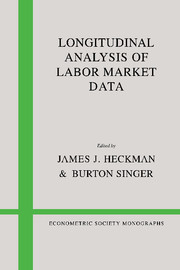Book contents
- Frontmatter
- Part I. Econometric studies
- 1 Heterogeneity, omitted variable bias, and duration dependence
- 2 Social science duration analysis
- 3 Interpreting empirical models of labor supply in an intertemporal framework with uncertainty
- 4 Alternative methods for evaluating the impact of interventions
- Part II. Statistical studies
- Part III. Sociometric studies
- Name Index
- Subject Index
3 - Interpreting empirical models of labor supply in an intertemporal framework with uncertainty
Published online by Cambridge University Press: 05 January 2013
- Frontmatter
- Part I. Econometric studies
- 1 Heterogeneity, omitted variable bias, and duration dependence
- 2 Social science duration analysis
- 3 Interpreting empirical models of labor supply in an intertemporal framework with uncertainty
- 4 Alternative methods for evaluating the impact of interventions
- Part II. Statistical studies
- Part III. Sociometric studies
- Name Index
- Subject Index
Summary
Introduction
Much of the empirical work on labor supply ignores life cycle theory, and practically none of it admits the possibility that consumers are uncertain about future events. A natural question that arises concerns the implications of these factors when evaluating and interpreting estimates of wage and income effects found in the existing literature. This study provides an answer to this question. While the discussion here concentrates on hours of work behavior, it fully applies to the analysis of consumption behavior as well.
The chapter begins with the development of an economic model of consumption and labor supply behavior in an intertemporal environment in which the consumer is uncertain about his future income, the future relative prices of consumption and leisure, and variables influencing his future preferences. A consumer making decisions in this model reacts differently to changes in variables than he would in a deterministic setting. In response to a change in the current wage rate, for example, the adjustment the consumer makes in his consumption and in hours of work depends on how much of this change was anticipated and how it alters expectations concerning future wages. Because the economic model considered here explicitly addresses such issues, it provides some direction on how to account for the various aspects of uncertainty when specifying empirical relations.
- Type
- Chapter
- Information
- Longitudinal Analysis of Labor Market Data , pp. 111 - 155Publisher: Cambridge University PressPrint publication year: 1985
- 16
- Cited by



